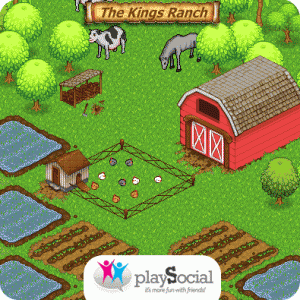Before FarmVille: Origins of The Digital Agricultural Revolution
Farm games are a craze on social networks worldwide, but its origins are mistaken. The story of farm games is a reflection of the young social games industry: rife with copycats, riches, and misunderstandings.
Origins
Most social games are far from revolutionary: farm games pre-date their social network successors by 15 years. SimFarm, released by Maxis in 1993, is the earliest to this author’s knowledge. Harvest Moon, released by Victor Interactive Software in 1996, further popularized the genre. To date, the spread of social games is all about distribution, not original gameplay.
China is most often cited as the source of the first social farm game, which is half-true. Happy Farm (开心农场) was released by Five Minutes in "November 2008" (China Social Games is waiting to receive confirmation of an exact date). The inspiration for Happy Farm was Harvest Moon, the earlier cited Japanese console game. It went on to become massively popular in China, attracting litters of copycats.
But the frequent claim that Facebook developers copied this game is false. At the same time, US-companies playSocial and Take(5)Social released myFarm, the first farm game on Facebook. Tom Hansen, President of Take(5)Social, writes:
myFarm was the original farming game on Facebook. We launched Nov 1st 2008. My team came up with the concept based on Lil’ Green Patch and the success that it was having. If people wanted to collect and gift pets and flowers for their little green patch, how cool would it be to take animals gifted to you and raise them. Being able to raise them on your own ‘farm’ was the obvious choice. Then of course harvesting crops to earn cash fit perfectly with the farm theme and voila the concept was born.
Farm Town by Slashkey and FarmVille by Zynga copied myFarm, not Happy Farm.
Gameplay between Happy Farm and myFarm is significantly different: Happy Farm zooms in on a few plots while myFarm is a more expansive sandbox-style game with animals, gifts, and buildings. Season Xu, co-founder of Five Minutes (developer of Happy Farm), writes:
myFarm, Farm Town, FarmVille, are different from Happy Farm and all Happy Farm copies. The game play between ‘Farm Town’ type and ‘Happy Farm’ type is very different… [they] did a good job of innovation. They invented a new type of farm game… Happy Farm is not the original Farmville
Farm Town is.
In short, Happy Farm and myFarm—the first two social farming games—were independently developed and released in China and the US at almost exactly the same time. Both borrowed from earlier games, Harvest Moon and Lil’ Green Patch, respectively.
Two Lessons from the Field
#1) Being First is No Guarantee of Riches

Developing a new trend in social games is no guarantee. Unless you also happen to be genius in distribution, like Zynga.
myFarm enjoyed modest success, but bigger competitors like Farm Town and FarmVille have blown it up. Hansen writes, “We have since been inundated with copy cats that have big advertising budgets, so competition has since diluted the market.”
Slashkey released Farm Town in April 2009. It remains the 20th most popular game on Facebook with 2 million DAU (daily active users). Following Farm Town’s success, Zynga released FarmVille in July 2009. The game we all know (and love?) took farming to another level, with 27 million DAU today.
Happy Farm has done well, but not great. It remains massively popular with an estimated 23 million DAU (includes clones across all platforms), but China’s users are challenging to monetize and social networks are closed or offer poor revenue share.
Being first is no guarantee of riches. Zynga has a speculative $5 billion valuation not because its “_Ville” games were first or original, but because it executes aggressive advertising and pushy virality (inundating friends with requests) better than anyone else. Again, the spread of social games is all about distribution, not original gameplay.
#2) Why Farm Games?
Commentators like to pontificate on how Chinese city-dwellers are “returning” to the farms they only recently left. Isaac Stone Fish at Newsweek waxes poetic:
The game's success reflects a deep and growing nostalgia for China's traditional agrarian way of life… the game also taps into concerns among many members of the urban middle class that economic growth has far outpaced the country's environmental standards. Poor air and food quality are both major concerns, and Happy Farmer reflects a wistfulness for a rural China that at least in the romantic image does not suffer from such problems.
But these claims are farfetched and fail to explain FarmVille’s popularity in America, hardly a nation of farmers. In addition to farming, are social gamers also nostalgic about flipping burgers, hunting treasure, raising fish, and fighting mafia wars?
Farm games succeeded by crossing addictive game mechanics with an intuitive, accessible theme. Farm games popularized “appointment” game mechanics, in which players need to check-in every few hours to plant, water, tend, or harvest their crops. This game mechanic is dominant across the top social games today, having been applied to “growing” fish, pets, restaurants, cities, et al. But farming crops is still the best fit with these mechanics. And every culture has a concept of farming, though specifics may differ slightly (China’s version lacks tractors).
Lastly, there is certainly also an element of serendipity, that these games were independently developed and released in China and the US at the same time and then grew to popularity.
Farm games also demonstrate that game themes and mechanics are universal. Fish, pet, and restaurant games have since gone on to become global hits, with cross-pollination between China and Facebook.
Every country is at play in the digital agricultural revolution.
Kai Lukoff is an analyst at BloggerInsight and an editor on China Social Games. Follow Kai on Twitter
Pages
Categories
- English
- Game Analysis
- game developers
- Publishers
- Social Networks
- Top Social Games
- Uncategorized
- Virtual Currency
Blogroll
Archive
- September 2010
- August 2010
- July 2010
- June 2010
- May 2010
- April 2010
- March 2010
- February 2010
- January 2010
- December 2009
Meta
- Log in
- RSS
- Comments RSS




May 6th, 2010 - 07:54
Sure, there have been farming video games since the 80′s and Happy Farm was certainly not the first, but with its clear success in the China market, it was undoubtedly the inspiration for Zynga’s Farmville and not Farm Town. Up to now China has had a reputation as a copier and not an innovator and 5 Minutes has shown that Chinese can innovate to the point where other markets will copy from China.
May 6th, 2010 - 16:51
Hehe I have been researching this story for a bit too. After talking to Playfish and 5 Minutes who were at “Inside Social Games” where I moderated a panel on “Internationalization of Social Apps”, it looks like:
Season @ 5 Minutes thinks that the Farm Town was the original
BUT
apparently the guys from Slashkey were looking around for games successful on non-Facebook networks and came across Happy Farm
HOWEVER
They also thought that the game required quite a bit of “culturization” and made important changes.
SO
Inspired? Copy? You pick your term, but the first “social farm” seems to have originated in China.
I generally give a chance to the idea of independent reinvention, but this time I am quite convinced about the Copy-to-US. The farming nostalgia is fun – to balance with the mafia nostalgia (luckily? the Chinese government does not allow mafia-theme games).
Another key learning from the panel I moderated was that even with the same theme, there are important cultural differences. For instance:
- Why did Japanese users protest about the price of the watermelon in Sunshine Ranch?
- Why do US users dislike the “steal vegetable” teasing function?
Aside from metrics and general theme, success is about fine-tuning to cultures too.
May 6th, 2010 - 18:21
Fascinating that Slashkey should say that they looked to Happy Farm in China (and that Season of Happy Farm is of another mind)! I emailed Slashkey a while ago, but didn’t hear back.
I still think the design of Farm Town (and FarmVille) is far closer to myFarm than Happy Farm. Everything from the openness of the game, the graphics, to the key action buttons “plow” and “harvest” are lifted from myFarm. ISG writes, “At first glance, [FarmTown] is a direct clone of myFarm. However, when given a closer look, it is not only prettier to look at but contains a great deal more depth too.” http://www.insidesocialgames.com/2009/05/27/farm-town-part-yoville-part-myfarm/
myFarm was on the leaderboard, so was certainly on the radar for Slashkey and others: http://www.insidesocialgames.com/2008/12/08/top-25-facebook-games-for-november-24-2008/
But myFarm never exploded like Happy Farm in China. The level of success enjoyed by Happy Farm in China should have been (and sounds like it was) impetus for Slashkey. Instead of “localizing” or “culturalizing” Happy Farm though, it appears that they copied and expanded upon myFarm.
In light of the Slashkey info, I’d co-award the prize for first “social farm” to the myFarm and Happy Farm teams, if it were up to me.
I’m not sure how much significance to assign cultural differences in social games. The early games in China are certainly very different, far more competitive (with stealing, etc.): https://chinasocialgames.com/?p=135 But then again, the recent RenRen Restaurant and Happy Restaurant are knockoffs of Restaurant City by Playfish, with minimal localization. Both are second only to farming in terms of popularity.
I think we’ve seen that top games in China don’t translate into mass-market hits on Facebook. I think this is mainly bc gameplay and distribution is not sophisticated enough to compete with Zynga et al, not due to cultural differences.
Could the top games on Facebook conquer China as is? I don’t know–there’s no good data on this point. I think Chinese networks and regulators would be loathe to allow it. And China is a comparatively small market in terms of monetization so the big developers don’t much care yet.